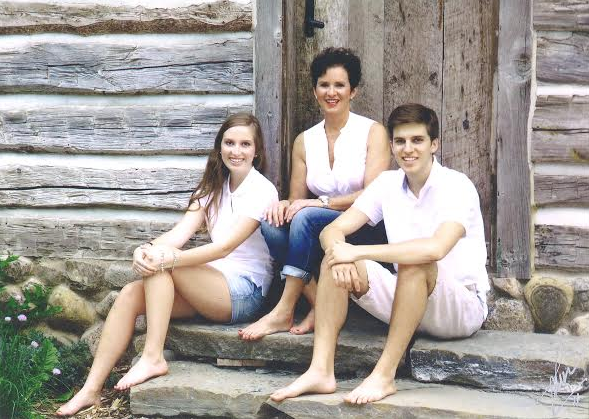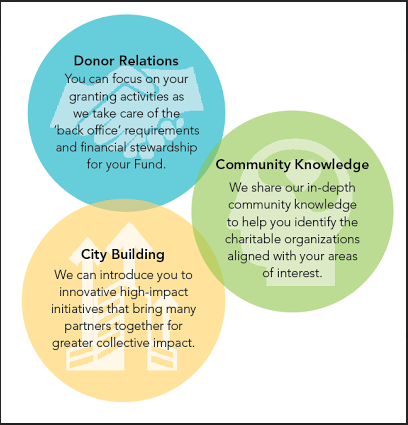The two sides of philanthropy: The story behind Toronto Foundationís Vital People grant
Elena Yunusov |
Wednesday, March 30, 2016
It’s the little grant that could. Kaitlin Wainwright, director of programming at Heritage Toronto, has been chosen as a recipient of the prestigious Vital People grant administered by
Toronto Foundation. Wainwright’s support came through a donor-advised fund established by Susan Latremoille, a Toronto philanthropist who takes her work and its impact very seriously, while finding much joy in it.
What it means to give: Susan Latremoille and her two children take a strategic approach to philanthropy
“When Toronto Foundation put out their vital people list -- a roster of individuals in the city who are doing really great work and need financial support to be able to continue that work -- I thought it’d be a good idea to provide one of the vital people with funds to keep their work going,” Latremoille told YongeStreet. Susan Latremoille is a wealth advisor by profession, who works with wealthy people to manage and plan for their financial future. “I’ve been doing this work for 30 years, and I really felt there were a lot of people who had money and were very unhappy, and there were a lot of people who were happy and had money,” Latremoille said. “I wrote a book about it. I thought the mantra for having the rich life really comes down to this: live well, give back, leave a legacy.”
Latremoille has involved her children in philanthropy ever since they were teenagers, letting them steer strategy decision-making to support various causes through funds.
“We all thought Kaitlin's work with Heritage Toronto is very important; many other cities honour their history, while we tend to just tear everything down,” Latremoille said. “Kaitlin was very articulate and passionate about what she is doing; and the money would go to further education. We had a real meeting of the minds.”
 “Through Toronto Foundation, you can provide funds to registered charities, and if you live in Toronto and care about the city, you can zero in on precise areas of interest,” Latremoille said. “It’s very meaningful and satisfying to be connected to the city that way.”
“Through Toronto Foundation, you can provide funds to registered charities, and if you live in Toronto and care about the city, you can zero in on precise areas of interest,” Latremoille said. “It’s very meaningful and satisfying to be connected to the city that way.”
What it means to receive support: Kaitlin Wainwright of Heritage Toronto feels ready to take the next steps
“I made my applicant submission to Toronto Foundation at the end of October last year. Being recognized as one of the Vital People really came a full circle for me. My father was a philanthropist through London Community Foundation, part of the community foundations of Canada, and he instilled in me a sense of philanthropy as an important part of city building, and community building. When the opportunity came up for the Vital People grant, I’d been thinking about what I needed to do to take the next step forward,” Wainwright told YongeStreet.
Wainwright thought that some aspects of Heritage Toronto programming, in particular its digital programs, could be more robust, -- there are numerous opportunities to engage in national and international conversations about heritage and heritage preservation. “The money will allow me to take courses at OCAD on podcasting and interactive media design, to allow people to engage with our problems beyond the physical experience, and use those narratives as jumping off points to talk about Toronto today and in the future,” Wainwright said. “We are working closely with communities and to facilitate and enhance their expressions of their local history, and I’ll also be looking at how other museums approached that work, to improve our practices in telling Toronto’s stories and histories.” Most importantly, with the award came an opportunity to join a larger network of Vital People grant recipients, and have conversations across fields to gain a deeper understanding of the not-for-profit world, according to Wainwright.
“We want people to walk away from our programs and think, oh I never thought of Toronto that way,” Wainwright said. Looking at the past helps us plan for the future. The current exhibit, Toronto the Just: Stories of Women and the Struggle for Equality, created by Women in Toronto Politics and Heritage Toronto, features Jane Jacobs and her ambition to make cities accessible to everyone; Doris Anderson, former editor of Chatelaine, journalist, author, and champion of women’s rights, who advocated for proportionate representation in 1960s, and others.
As we talk about building subways, for example, Wainwright suggests it might be helpful to think about Toronto’s Prince Edward Viaduct. Its engineers had the foresight to allow trains to pass above the valley, even though Toronto didn’t have a subway at the time. “Heritage work, to me, is about bridging the past with the future,” Wainwright says. “We make decisions today and we don’t often think in that moment, that our decisions will be historical 20 years out.”
Toronto Foundation facts and stats

- In 2013-2014, the Toronto Foundation directed $7.3 million to more than 600 registered charities.
- Vital Signs® has been adopted by 49 communities across Canada and by 17 communities internationally across six countries and four continents.
- Established in 1981, the Toronto Foundation is one of 191 Community Foundations in Canada.
- The minimum amount needed to start a Fund is $25,000
- The Vital Toronto Fund, Toronto Foundation’s community Fund supports Vital People, Vital Ideas, and Vital Youth strategic grant programs, as well as initiatives that address issues identified in the Toronto’s Vital Signs®Report
To find out how you can make the most of your giving, contact Aneil Gokhale at [email protected]
This story is produced in partnership with the Toronto Foundation